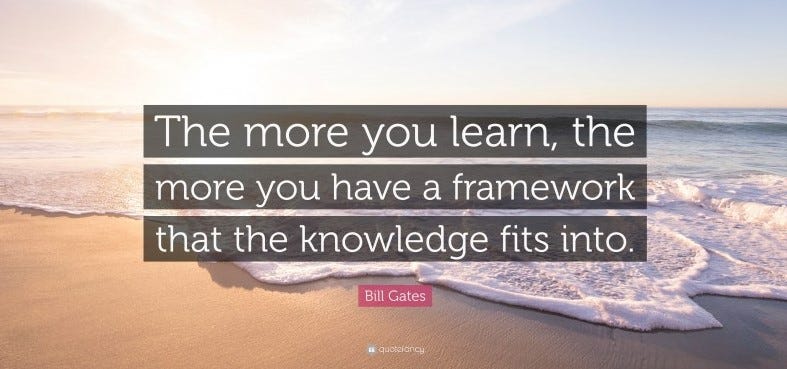Mastering the Game: how to choose your training?
Harness the power of diverse approaches to achieve your goals
In previous posts I’ve mentioned that being in sales is similar to being involved in sports, ie. racket sports. The key question is: which sport? Each sport demands specific training—whether it’s focused on technical skills, physical fitness or equipment. Similarly, sales requires various methodologies and approaches to succeed.
Throughout my professional journey, I’ve had the opportunity to experience various sales trainings and read numerous books on the subject. One thing I’ve come to realize is that “training” in sales is a vast domain that deserves a bit of unpacking. The methodologies available tackle different aspects of the selling process and activities, each offering unique insights and techniques.
“The only thing worse than training employees and losing them is not training them and keeping them.” Zig Ziglar
It’s important to note that my intention here isn’t to rank these methodologies. As I’ve mentioned in earlier articles, I believe that the more tools you have at your disposal—the more training you undergo—the better equipped you’ll be to navigate diverse situations in your sales career.
Based on my experience and research, I can categorize sales training into three main groups:
Customer engagement focused
Process oriented
Methodology and strategy focused
As you can see, these methodologies are more complementary to each other than exclusive.
“The goal of training is to create an army of thinkers, not robots.” Robyn Shulman
1. Customer Engagement Focused
This category emphasizes how sales professionals interact with customers, focusing on building relationships, understanding needs, and engaging in meaningful conversations.
Challenger Sales Model
Overview: encourages salespeople to challenge customers’ thinking and provide insights that can reshape their understanding of their needs.
Reference: The Challenger Sale: Taking Control of the Customer Conversation by Matthew Dixon and Brent Adamson. Link
Consultative Selling
Overview: prioritizes understanding customer needs and acting as a trusted advisor, fostering strong relationships and tailored solutions.
Reference: Consultative Selling: The Hanan Formula for High-Margin Sales at High Levels by Mack Hanan. Link
Provocative Selling
Overview: aims to provoke thought and challenge the customer's status quo, encouraging them to reconsider their current strategies.
Reference: The New Solution Selling: The Revolutionary Sales Process That is Changing the Way People Sell by Keith M. Eades. Link
Value Selling
Overview: focuses on demonstrating the ROI and benefits of solutions in a way that resonates with the customer’s business objectives.
Reference: Value-Based Selling: How to Sell What You Are Worth by T. J. Walker. Link
Behavioral Selling
Overview: this approach focuses on understanding buyer behaviors and tailoring sales techniques accordingly to align with their preferences.
Reference: Link
The Challenger Customer
Overview: identifies key influencers within customer organizations to navigate complex buying groups effectively.
Reference: The Challenger Customer: Selling to the Hidden Influencer Who Can Multiply Your Results by Brent Adamson, Matthew Dixon, and Nicholas Toman. Link
SPIN Selling
Overview: centers on asking strategic questions about Situation, Problem, Implication, and Need-Payoff to uncover customer needs and facilitate sales conversations.
Reference: SPIN Selling by Neil Rackham. Link
2. Process-Oriented
Methodologies in this category provide structured frameworks for managing the sales process and qualifying leads, helping sales teams streamline their efforts and focus on high-potential opportunities.
MEDDIC
Overview: a qualification framework that emphasizes Metrics, Economic Buyer, Decision Criteria, Decision Process, Identify Pain, and Champion to qualify leads effectively.
Reference: Link
N.E.A.T. Selling
Overview: focuses on identifying Needs, Economic impact, Access to power, and Timeline to qualify and prioritize leads systematically.
Reference: Link
BANT
Overview: a classic qualification framework focusing on Budget, Authority, Need, and Timeline to evaluate leads and their potential for conversion.
Reference: Link
3. Methodology and Strategy Focused
This category includes methodologies that guide overall sales strategies and align with marketing and business goals, providing frameworks for effective execution.
Account-Based Selling (ABS)
Overview: targets high-value accounts with personalized strategies, aligning sales and marketing efforts to engage key decision-makers.
Reference: Account-Based Marketing for Dummies by Sangram Vajre and Eric L. Quanstrom. Link
Sales Acceleration Formula
Overview: a data-driven methodology focusing on optimizing the sales process using analytics to improve performance.
Reference: The Sales Acceleration Formula: Using Data, Technology, and Inbound Selling to go from $0 to $100 Million by Mark Roberge. Link

Conclusion
As we’ve explored, the world of sales methodologies is diverse and multifaceted. Each methodology offers valuable insights tailored to different aspects of the sales process and activities, whether it’s enhancing customer engagement, streamlining processes, or aligning with broader business strategies.
Rather than viewing these methodologies as competing approaches, it’s essential to recognize their complementary nature. By equipping yourself with a variety of tools and techniques, you can adapt to the ever-evolving landscape of sales and respond effectively to the unique challenges posed by different customers and situations.
In today’s competitive environment, flexibility and adaptability are key. Embrace the opportunity to learn and implement different methodologies as part of your sales toolkit. By doing so, you’ll be better prepared to build meaningful relationships, drive results, and ultimately achieve greater success in your sales career.
Share your experiences with any of the trainings mentioned here, and/or let me know about others not listed here.
Happy learning.

